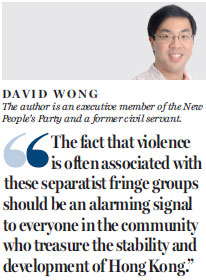Anti-declaration an election trick
Updated: 2016-08-08 08:31
By David Wong(HK Edition)
|
|||||||
The author is an executive member of the New People's Party and a former civil servant.
David Wong writes that returning officers' decisions to disqualify the nominations of certain LegCo election candidates are well-founded on the relevant ordinances
The Electoral Affairs Commission (EAC) requires all candidates in the upcoming Legislative Council elections to sign a new confirmation form, which states that the candidate understands the Basic Law, notably Article 1, 12 and 159(4). After the new requirement was announced, the opposition camp reacted strongly, with some members resorting to a judicial review.
Actually, the nomination form has previously included a declaration which reads "I declare that I will uphold the Basic Law and pledge allegiance to the Hong Kong Special Administrative Region". In other words, there has always been a requirement for candidates to confirm their support for the Basic Law before they are allowed to run in elections. Elected legislators also have to take an oath to support the Basic Law and pledge allegiance to the Hong Kong SAR. Therefore, the new confirmation form requires the candidates to do nothing more than what they have been required to do in previous elections. And this in no way suppresses political rights, as claimed by some opposition parties.

Some might criticize this confirmation form as redundant. I have participated in several elections previously and have a basic understanding of various election-related ordinances and requirements. I can say that many of the procedures required by the EAC are very tedious, repetitive or even useless. For example, it requires candidates to develop four copies of their personal portraits and paste them onto various forms. In today's electronic age, one digital copy should suffice. Candidates also have to print and paste their election platform onto a specific grid paper and a soft copy is not acceptable. And with the prevalence of social media, it is now essential and sensible for candidates to post new messages, photos and videos online every day; unfortunately, all posts and replies must be filed as election advertisements to the commission, which is an extremely annoying and time-consuming exercise.
Nonetheless, most if not all candidates still follow these requirements to the letter. After all, the election-related rules are formulated in accordance with Chapter 542 of the Hong Kong law - the Legislative Council Ordinance. Personal preferences and opinions of individual candidates are not what the EAC cares about. Its duty is to ensure that elections are held in a legal and orderly manner. If candidates do not agree with the commission's decisions, whether it is related to the confirmation form or the validity of their candidacy, they can apply for a judicial review and some of them have just done that.
The opposition candidates do not want to sign the confirmation form for several reasons. Firstly, they want to politicize this issue by accusing the government of oppressing them in order to mobilize their supporters to vote. Secondly, they might feel that signing the form would be seen as a gesture of submission to the government. Thirdly, some opposition parties are in fact either overtly or covertly pushing for "Hong Kong independence" under the disguise of "self-determination". If these people were to sign the new confirmation form and, subsequently, continue to issue public statements in support of independence, they would have contradicted their own declaration and may be accused of making false statements.
After the nomination period ended last month, the nominations of several aspirants were declared by the returning officers to be invalid. Although these decisions are based on the relevant ordinances and the public statements made by these aspirants, they have still triggered strong protest. Some political groups have even tried to incite yet another round of riots in protest at the nomination results. The returning officers, being politically neutral civil servants, now have to endure undeserved insults and even threats from radical netizens. As mentioned above, this kind of dispute should be resolved in a civilized, legal manner; and applying for a judicial review has been a common practice.
It is really sad that violent confrontation is increasingly becoming commonplace in Hong Kong these days. Violent actions such as these erupted at the briefing session for candidates on Aug 2 no longer raise many eyebrows in the community. In-fighting among different radical groups is getting fiercer; they are using ever more disruptive and violent tactics to compete for media attention. The fact that violence is often associated with these separatist fringe groups should be an alarming signal to everyone in the community who treasure the stability and development of Hong Kong. We should be extremely vigilant against such growing menaces which are jeopardizing what the city has achieved through the hard work of generations of Hong Kong people.
(HK Edition 08/08/2016 page1)